Tenth Portland Buddhist Festival Rich in Dharma
Written by: Jeff Kerr
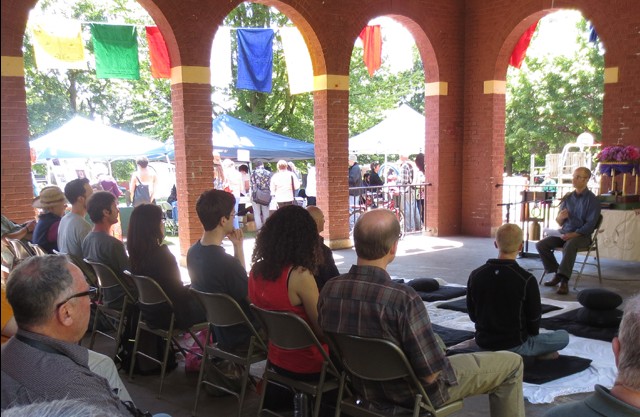
Dan Rubin, a psychologist and member of the Portland Shambhala Center, was the keynote speaker for the day. Rubin spoke about mindfulness of joy, and about the importance of not taking ourselves too seriously.
Like a cloud in the sky, the 10th annual Portland Buddhist Festival passed through Colonel Summer’s Park on the first day of June.
The event was an opportunity for many different Buddhist sanghas to celebrate the diversity of their traditions, and for the general public to learn more about Buddhism. The primary sponsor was the Portland Chapter of the Buddhist Peace Fellowship.
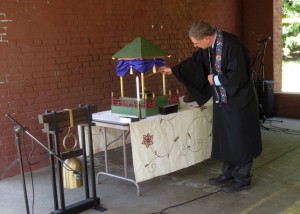
Rev. Gregory Gibbs, from the Oregon Buddhist Temple, lights a stick of incense from an altar. Oregon Buddhist Temple has been a major sponsor and contributor to the festival for several years, and provided equipment and supplies for the festival.
The festival went from 11 a.m. to 4 p.m., and featured events including a keynote talk, workshops, a bathing-the-Buddha ceremony, a sing-a-long, and much more. Here are more photos.
A children’s pavilion offered games and activities, and a scavenger hunt encouraged the children to explore the different tables and exhibits organizers had placed around the park. About 20 different groups set up tables, and those tables provided opportunities for the public to learn more about the groups, ask questions, and obtain flyers or other literature.
The participating groups represented many different Buddhist traditions including Zen, Tibetan, Pure Land, and even some groups not connected to a specific Buddhist lineage.
The Oregon Buddhist Temple, a Jodo Shinshu Pure Land Buddhist group, provided a lot of support for the festival. They hosted all of the planning meetings, provided some of the large structures such as the children’s pavilion, and they set up the sound system. Twenty groups had a table or provided sponsorship for the event.
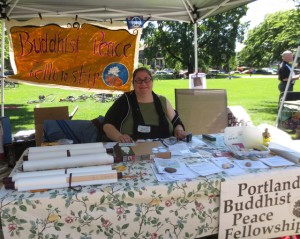
The Portland Buddhist Festival was organized by the Portland Buddhist Peace Fellowship, in collaboration with many local Buddhist groups. Heidi Hoogstra, a key organizer, is a leader of the Buddhist Peace Fellowship and a member of Dharma Rain Center, a local Zen group.
In addition to the Buddhist groups, several vendors sold products at the festival. Four carts offered food, people at two booths sold meditation supplies such as cushions and bells, and a booth offered Tibetan products. Organizers limited the number of vendors, so the festival would not become too commercialized.
The keynote talk was given by Dan Rubin, a local psychologist and a member of the Portland Shambhala Center.
Rubin discussed his insomnia, which he described as ironic. He said it’s ironic because while he aspires to wake up in his life, not being able to sleep has been a problem for him. Rubin identified what he called “mindfulness of joy” as one way through insomnia. This joy includes being grateful for one’s life and the good fortune one has, he said, and it also involves having a sense of humor and learning laugh at oneself.
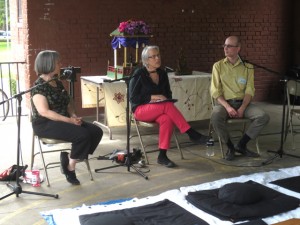
For the afternoon panel discussion three experienced practitioners discussed various aspects of Buddhist practice. From left to right: Rayna Jacobsen, from the Portland Shambhala Center; Nelly Kaufer, from Pine Street Sangha; and Charley Reneau, from the Oregon Buddhist Temple.
Rubin’s talk was quite funny at times, and many in the audience seemed to relate to being unable to sleep, and how crazy it can make the mind.
A panel discussion featured three presenters, each talking about different aspects of Buddhist practice.
Charley Reneau, from the Oregon Buddhist Temple, described ways to be more awake and present with daily life. He talked about the “flow state” a person can achieve in daily activities, where one is focused on doing just one thing at a time.
Nelly Kaufer of the Pine Street Sangha described what she called “recollective awareness” meditation. This style of meditation emphasizes an open curiosity about one’s experience, and does not require the use of one specific meditation object. Instead of continually returning attention to the breath, for example, meditators are invited to examine and explore whatever state of mind is present, giving up the need to control or change their state of mind.
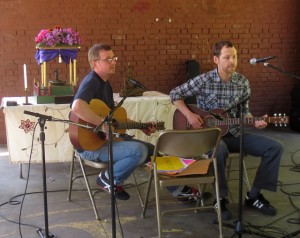
Christopher Dumm and Gabe Fields, leading the audience in Dharma School songs from the Dharma Rain Zen Center.
Rayna Jacobsen, from the Portland Shambhala Center, ended with an overview of the Shambhala teachings, especially the teachings on basic goodness. She said the Shambhala teachings were originally intended for an ancient king, who wanted to practice the Buddhadharma in the world without giving up his throne and becoming a monk.
Jacobsen said that the Shambhala teachings have much relevance for lay practitioners in the West, who work in jobs and raise families.
The Portland Buddhist Festival was founded 10 years ago by the Portland Chapter of the Buddhist Peace Fellowship.
The purpose of this organization is to serve as a catalyst for socially-engaged Buddhism. This can mean different things to different people, but generally it encourages practitioners to take compassionate action in the world, and to participate in movements for social justice, environmental sustainability and peace.
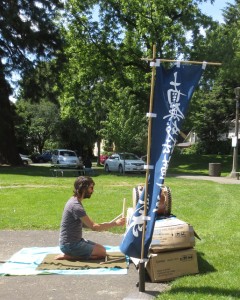
The sounds of a Japanese temple drum floated over the festival grounds.
Heidi Hoogstra, a practitioner at the Dharma Rain Center, has been the main coordinator for the Portland Chapter of the Buddhist Peace Fellowship, and was the primary force behind this year’s festival.
When asked why she wanted to create this festival, Hoogstra said, “Buddhism saved my life. I want to give back. This is a wonderful way for people who are Buddhist in Portland to get together and for people who don’t know about Buddhism to get informed a bit.”
She added, “I feel lucky that in Portland we have so many offerings—so many different types of Buddhism.”
Photos by: Jan Van Raay
